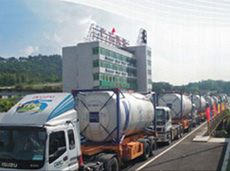As one of the earliest cities opened to the outside world, Guangzhou's economy develops vigorously and it's now a perfect fit for investment and living. To date, 170 Fortune 500 companies have launched investment projects in Guangzhou. Meanwhile, Guangzhou is China's third largest host city of conventions and exhibitions, after Beijing and Shanghai. The city has first-rate convention and exhibition facilities. Each year, the city plays host to more than 350 large-scale exhibitions and over 1,100 demonstration and promotion events.
Guangzhou is an important industrial base in China and a comprehensive industrial manufacturing center of South China. Through years of development the city has established itself as an export-oriented modern industrial system with a complete range of specialties, a relatively developed light industry, and a heavy industry of certain scale. It boasts comprehensive capabilities, a highly developed scientific research capability and the ability to develop new products rapidly. Of China's 40 major categories of industrial sectors, Guangzhou has 34. Industry plays an important role in the city's contribution to the national economy. This added value accounts for more than one third of the city's GDP. The industrial output value of the three pillar industries--Automobile manufacturing, electronic communications and petrochemical industries--accounts for about one-third of the city's industrial output value. With the introduction of advanced technology and the upgrade of light textiles, food, medicine, building materials and other traditional industries, many new industries and high-tech industries represented by electronic communications, electrical appliances, fine chemical industries and petrochemical products are developing rapidly.
Guangzhou is the largest commercial and communications center in South China. The tertiary industry sector has been developing so rapidly that it is being called "industrialized", having many levels, offering high-quality services, and presenting local color. At present, Guangzhou's tertiary industry has developed into such an important industrial structure including the communications and transportation industries, commerce and trade, social services and tourism, the real estate industry, and the financial and insurance industries are classed as the main industries in the area.
With a long history, and being China's earliest foreign trading port, Guangzhou has a quite important position in the world. From the 1950s to now, the world-renowned Chinese Export Commodities Fair has been held in Guangzhou. It won the title of "China's First Exhibition", for it has the largest scale, the longest exhibiting time, the highest grade of participants and the largest turnover of all fairs in China. In 2007, with the important change in China's foreign trade strategy, the Chinese Export Commodities Fair was renamed the China Import and Export Commodity Fair, and for the first time an import gallery was set up.
In four consecutive years from 2003 to 2006, every year, Guangzhou's Foreign Trade realized an increase of 10 billion dollars, totaling 63.767 billion U.S. dollars in 2006. As of June 2009, among the world's top 500 multinational enterprises, 170 have come to Guangzhou for investment with 329 foreign direct investment enterprises have been established and with a total investment of 11.244 billion U.S. dollars. Most multinational companies take Guangzhou as part of its regional processing and manufacturing bases in their global strategy. Some enterprises have set up research and development centers and as well as maintenance test centers in Guangzhou.
In the past, Guangzhou's major export commodities were textile products and primary products but now, with industrial upgrading, the export product structure has changed. Guangzhou's major export products now also include high-end manufacturing products, high-tech products, biotechnology, aerospace technology, materials products, software, automobiles, etc. Its major export markets are the Hong Kong Special Administrative Region, the United States, the EU, Japan, and ASEAN.
Guangzhou Economic and Technological Development Zone (GETDZ)
Guangzhou Economic and Technological Development Zone (GETDZ) is one of the first national economic development zones in China, which was established in 1984. It is located at 30 kilometres away from the west of Guangzhou downtown. It has a developed area of 17.67 square kilometres.
There are six pillar industries in the zone, including chemical materials and products, electric machinery, foodstuffs, electronic equipment, metallurgy and metal fabricating, and beverages. The zone was merged to Luogang District, a new-form district in Guangzhou, in 2005.
Nansha Development Zone (NDZ)
Nansha Development Zone (NDZ), is in southeast Guangzhou and at the mouth of Pearl River. Nansha covers 536 km2 and locates right at the geometrical center of the Pearl River Delta. Almost all the cities of the Pearl River Delta are within a radius of 100 km. Nansha is provided with strong market potential and influences and its strategic position is outstanding.
The exploitation of Nansha follows the essential ideas of "Start by Industry, Continuous Development". Breaking through with the construction of the modern infrastructure construction, Nansha will focus on the development of 8 pillar industries of shipbuilding, harbor logistics, automobile manufacturing, machinery and equipment manufacturing, iron and steel, petrochemical, grain logistics and processing, micro-electronics and photo-electron.
As the key part of Guangzhou urban development strategy of "South exploitation", Nansha Development Zone will be built into a modern city with the construction of modern living supporting facilities promoted by industries.
Zengcheng Xintang Industrial Processing Zone
Zengcheng Xintang Industrial Processing Zone was set up in January, 1988 with the approval by Guangzhou Municipal People's Government. It is located in the east of Guangzhou, in the south of Zengcheng City and close to the Guangzhou Economic and Technologic Development Zone. It is positioned along the central axis of Guangzhou - Dongguan - Shenzhen - Hong Kong, where has been enjoying a name of "Gold Corridor". The geographic location is quite favorable.
Xintang Industrial Processing Zone attaches importance to the development of foreign - oriented industries. It has introduced many foreign enterprises engaged in textile, fabrics, machinery, electronics, plastics and chemicals to operate at the Zone. Industry plays a guiding role while the tertiary industry has a sound development.

 Inquiry Basket (
Inquiry Basket (




